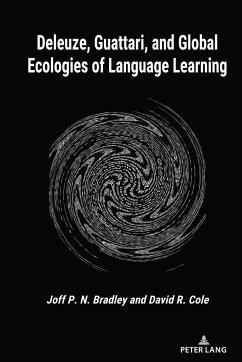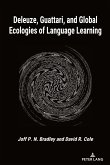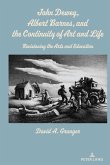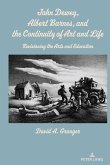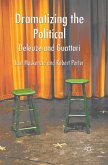This book is a selection of writings on Gilles Deleuze and Félix Guattari's philosophy and its connection with language learning. The authors are global experts in the field of language learning and schizoanalysis and have been collaborating on projects concerning Deleuze and Guattari for over two decades. They are the only scholars who have consistently applied Deleuze and Guattari to language learning. In addition to lecturing and co-writing on this topic, they have been working on projects concerning social ecology and the Anthropocene across the globe. This book attempts to put their multifaceted writings on language learning and teaching into systematic order.
Bradley and Cole offer a thoughtful and timely look at the intersections between the abstraction of philosophical theory and the pragmatic reality of language learning. As such, this book introduces the philosophy of Deleuze and Guattari and its use in the field of language learning in the tertiary education sector and elsewhere.The authors demonstrate how Deleuze and Guattari inform language learning and teaching in creative, unpredictable, and sometimes rupturing ways. The book introduces empirical research from Australia, Canada, the United States, and Japan that combines Deleuze's thought, literacies and multiliteracies theory to explain how students frequently have breakthroughs but, more often than not, have breakdowns in language learning. This book argues that the Deleuze and Guattari philosophical approach endeavours to understand the relationships between literacy, the literary, and literature use, and it extends multiliteracies into the multiple literacies theory of affect to develop an understanding of the complexities of learning - its breakdowns and hopefully its breakthroughs.
Bradley and Cole offer a thoughtful and timely look at the intersections between the abstraction of philosophical theory and the pragmatic reality of language learning. As such, this book introduces the philosophy of Deleuze and Guattari and its use in the field of language learning in the tertiary education sector and elsewhere.The authors demonstrate how Deleuze and Guattari inform language learning and teaching in creative, unpredictable, and sometimes rupturing ways. The book introduces empirical research from Australia, Canada, the United States, and Japan that combines Deleuze's thought, literacies and multiliteracies theory to explain how students frequently have breakthroughs but, more often than not, have breakdowns in language learning. This book argues that the Deleuze and Guattari philosophical approach endeavours to understand the relationships between literacy, the literary, and literature use, and it extends multiliteracies into the multiple literacies theory of affect to develop an understanding of the complexities of learning - its breakdowns and hopefully its breakthroughs.
"Bradley and Cole are two of the most active and proficient scholars to date working on Deleuze and Guattari. Their emphasis on language allows them to navigate through the emancipative project of a 'people to come,' a figurative species who speak the language of the most innocent of all destructions." Virgilio A. Rivas, Philosophy Department, Polytechnic University of the Philippines

